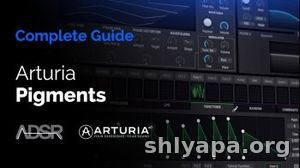ADSR Sounds Complete Guide to Arturia Pigments TUTORiAL

TUTORiAL | 481.81 MB
Links update: 20/02/2022
Pigments is Arturia’s newest Polychrome software synthesizer. Loaded with features, Pigments offers unlimited creative possibilities with absolute control. In this course you will explore every module of the new Arturia Pigments.
From the basics of the UI to the technical features of the wavetable and analogue engines to the creative opportunities allowed by Pigment’s Modulation capabilities. By the end of this course you’ll also be comfortable with the filters, voicing, effects and sequencer and be well equipped to apply the advanced features of Pigments to your sound projects straight away.
COURSE OVERVIEW
Indepth technical walkthroughs with plenty of practical insights and creative tips to get you up and running with Pigments right away.
Broken down into 13 sections:
•Introduction
•Header & Footer
•The Browser
•The Wavetable Engine
•The Analogue Engine
•Modulation Assignments
•Modulation Sources Pt 1
•Modulation Sources Pt 2
•Filter Types
•Voicing and VCA
•The Effects Page
•Effect Routings
•The Sequencer
COURSE FEATURES
•Watch, Listen and Learn – our easy to follow video instruction introduce you to classic techniques and technical insights
•13 walkthrough videos each providing a mandatory lesson on getting the most out of the Arturia Pigments Polychrome software synthesizer.
•Total runtime 126 minutes
•Practical instruction by an experienced tutor
•Learn at your own pace, watch as many times as you need to learn the lessons
LESSON SUMMARY
Introduction
Welcome to the course with an overview and introduction to Pigments
Header & Footer
A quick look at the features found in the header and footer of Pigments
The Browser
Explore the preset browser & playlists
The Wavetable Engine
as we begin to explore Pigments’ Synth Page we take a deep dive into the WaveTable Engine looking atWavetables, Morph & WT Position
The Analogue Engine
Continuing on the Synth Page get comfortable with Pigments’ Analogue Engine. From the main oscillators to waveshapes, the noise oscillator to a first look at modulation.
Modulation Assignments
A standout function of Arturia Pigments, we start a three-part section on modulation by walking through modulation assignments
Modulation Sources Pt 1
The first of two lessons dedicated to modulation sources. Explore the keyboard, envelope and LFO panels.
Modulation Sources Pt 2
Continuing your understanding of Pigments’ modulation sources to explore the customizable functions, as well as the random and combinate panels.
Filter Types
Discover the exciting features and functions of Arturia Pigments filters starting with the filter types before going into filter routing.
Voicing and VCA
The final video covering the Synth Page looks at Arturia Pigments Master Options and VCA or output section.
The Effects Page
Pigments has some very creative options when it comes to effects. This lesson walks through the Effects Page and gives you a taste of what’s on offer
Effect Routings
Continue your study of the effects page with a practical look at effects routing and how you further shape your sounds.
The Sequencer
The final lesson focuses on the Sequencer Page of Pigments, here you will learn how to setup, play, and customize arpeggios and sequences
[ Report broken link!!! ]

Русские пользователи - используйте ВПН для скачивания!
Наши ссылки не работают для России и возможно каких-то других стран!
Russian users - use VPN to download!
Our links do not work for Russia and possibly some other countries!


|

